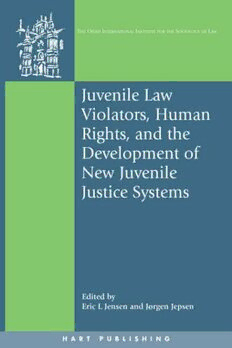
Juvenile Law Violators, Human Rights, and the Development of New Juvenile Justice Systems PDF
497 Pages·2006·3.502 MB·English
Most books are stored in the elastic cloud where traffic is expensive. For this reason, we have a limit on daily download.
Preview Juvenile Law Violators, Human Rights, and the Development of New Juvenile Justice Systems
Description:
This volume brings together scholars and practitioners from the US and Europe specializing in juvenile justice alongside scholars from Africa and Asia who are working on human rights issues in developing countries or countries in transition. The book presents two types of papers: descriptive and analytical academic papers on whole systems of juvenile justice or aspects of those systems (aftercare, restorative justice, etc.), and papers which deal with efforts to promote reform through international activity and through efforts to utilize modern theory in national reforms in developing countries (Malawi, Nepal, and Serbia) or in countries experiencing current or recent political and systemic changes or developments (South Africa, Germany, and Poland). The volume is also intended to throw light on recent trends in juvenile crime in various countries, the relationship between actual developments and popular and political perceptions, and reactions to such developments (including efforts to find alternatives to the incarceration of young offenders). A streak of new moralism is clearly discernable as a counteracting force against more humane reform efforts. The book throws light on developments in the actual parameters of juvenile offending, public and political demands for security and public intervention, and measures to provide interventions which are at the same time compatible with international human rights instruments.
See more
The list of books you might like
Most books are stored in the elastic cloud where traffic is expensive. For this reason, we have a limit on daily download.
